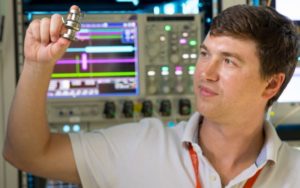March 2, 2020 — Last year, researchers at Fermilab received over $3.5 million for projects that delve into the burgeoning field of quantum information science. Research funded by the grant runs the gamut, from building and modeling devices for possible use in the development of quantum computers to using ultracold atoms to look for dark matter.

For their quantum computer project, Fermilab particle physicist Adam Lyon and computer scientist Jim Kowalkowski are collaborating with researchers at Argonne National Laboratory, where they’ll be running simulations on high-performance computers. Their work will help determine whether instruments called superconducting radio-frequency cavities, also used in particle accelerators, can solve one of the biggest problems facing the successful development of a quantum computer: the decoherence of qubits.
“Fermilab has pioneered making superconducting cavities that can accelerate particles to an extremely high degree in a short amount of space,” said Lyon, one of the lead scientists on the project. “It turns out this is directly applicable to a qubit.”
Researchers in the field have worked on developing successful quantum computing devices for the last several decades; so far, it’s been difficult. This is primarily because quantum computers have to maintain very stable conditions to keep qubits in a quantum state called superposition.
About the Chicago Quantum Exchange (CQE)
The Chicago Quantum Exchange (CQE) is an intellectual hub and community of researchers with the common goal of advancing academic and industrial efforts in the science and engineering of quantum information across CQE members, partners, and our region. The hub aims to promote the exploration of quantum information technologies and the development of new applications. The CQE facilitates interactions between research groups of its member and partner institutions and provides an avenue for developing and fostering collaborations, joint projects, and information exchange.
Source: Chicago Quantum Exchange (CQE)




























































